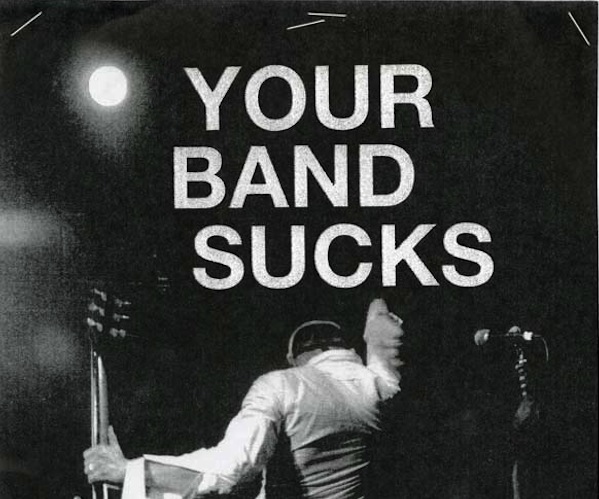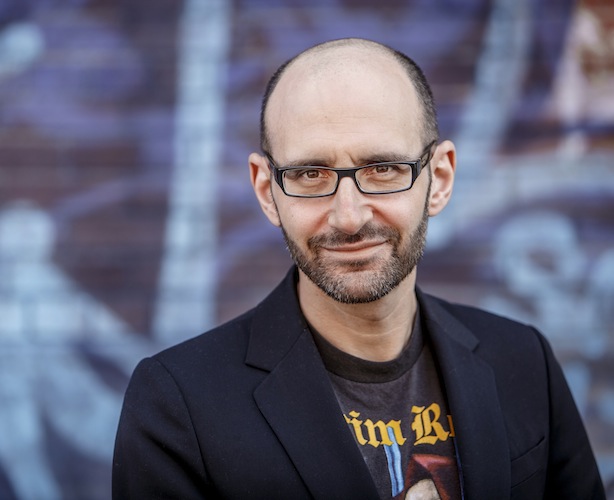Book Review: “Your Band Sucks” — Plying the Murky Terrain of Indie Rock
Jon Fine’s memoir of his career as a guitarist in a string of not-at-all to very-moderately-successful bands is an intriguing blend of history, sociology, entertainment, and a healthy dose of after-hours pulp.
Your Band Sucks by Jon Fine. Penguin/Viking, 320 pages, $27.95.

By Jason M. Rubin
When you title your book Your Band Sucks, you all but invite reviewers to respond in kind — ‘Your book sucks!’ In this case, such a rude and obvious retort doesn’t apply, but the subjective, confrontational attitude does. You see, Fine’s book is a memoir about his career as a guitarist in a string of not-at-all to very-moderately-successful bands plying the mucky terrain of what Fine labels at various times as punk, indie, hardcore, and underground rock.
The book’s full title is Your Band Sucks: What I Saw at Indie Rock’s Failed Revolution (But Can No Longer Hear). It neatly (if not concisely) details the problems Fine and his movement-mates experienced in the ’80s, ’90s, and ’00s: fierce competition for a small, undefined market, overambitious goals, unrealistic expectations that non-mainstream music will make an impact on mainstream art and commerce, and hearing loss. His story is an intriguing blend of history, sociology, entertainment, and a healthy dose of after-hours pulp.
Fine’s narrative, on the whole, is marked by a dry wit and brutal honesty — about himself and others. He never overstates his own abilities, though the many detailed trips inside his own OCD brain becomes tiring, and he effusively praises many of his peers. For anyone who likes rock music and/or has ever had a band or dreamed of forming one, Fine is easy to root for and yet his disillusionment over the low ceiling his bands bump up against seems oddly naïve. He heaps scorn on highly successful artists — such as Bruce Springsteen, U2, The Clash, Smashing Pumpkins, Phil Collins, and guitarists Eric Clapton and Mark Knopfler (“dullards”) — yet wishes he had been one. He also fails to recognize that the mainstream is always that, and anything extreme, exotic, complex, or experimental can never be part of it.
Enter Bitch Magnet
Of his various bands, the first, longest lasting, and most successful was called Bitch Magnet. Despite its relatively low album sales and media profile, it had an international audience and became hip enough to undertake a modest three-continent reunion tour in 2012-2013. Fine describes Bitch Magnet thusly: “We were steeped in the American independent rock underground of that time, we released three critically acclaimed records, we enjoyed a dedicated but not particularly sizable fan base, we toured Europe and America, and at no point were we threatened, even distantly, by actual fame.”
Though I don’t claim to being a fan of the type of music Bitch Magnet and its comrades played — I haven’t even heard of 99.5% of the bands he generously name drops throughout the book — I certainly understand his passion for music and the transformative effect it can have on a sensitive listener. It helps that we both came of age in the vinyl era: “No music freak from an analog generation really gets over the bond formed with the records they listened to over and over again,” he writes, “but this was when listening to this music always involved a series of physical and intimate transactions. The thrill of entering the record store that most people overlooked, the tactile sensation of carrying a fresh stack of records home, tucked under your arm, in crinkled square brown paper bags. In your room you slit the plastic wrap and inhaled the new vinyl-and-cardboard smell before slipping the record from its sleeve — gentle, bracing the hole in the center with your middle finger — and carefully laying it onto your turntable.”
In my case, it was progressive rock records, not hardcore punk or indie records, but there was the same rebellious thrill of listening devotedly to something decidedly different from whatever was played to death on commercial radio at the time. The music that you and a few similarly socially awkward friends enjoyed seemed much more important than the pretty boys and slutty girls on the cover of Rolling Stone or on regular rotation on MTV.
Formed at Oberlin College in Ohio, Bitch Magnet played Boston several times, and Fine gives big kudos to local institutions such as the Middle East, Newbury Comics, and the local college radio scene. In fact, he devotes the better part of a chapter to his band’s experiences in our fair city. In particular, he has very kind things to say about legendary Boston music promoter Billy Ruane, who died in 2010. “’Local legend’ is, of course, a terrible and overused term, but anyone from Boston — even anyone in a band that came through Boston — will testify that he deserved it,” Fine notes. He goes on to recall the last time he saw Ruane. “I last saw him at a Wipers show at New York’s Irving Plaza in the late nineties. He was dancing his spastic Snoopy dance in front of the stage as he always did, and though it had been years since we’d spoken, and though in fact we barely knew each other, when I tapped his shoulder, he recognized me, grabbed my cheeks, and kissed me on the lips. I miss him.”
Making a Living
One thing this rebel fails to properly acknowledge and explain (perhaps even atone for?) is the fact that he is now a white-collar professional living very comfortably. About two-thirds through the book, Fine admits he’s getting a little too old to rock and roll (at least on a dirty stage late at night) and a little too deeply in debt not to get a real job. And so he admits out of the blue that in 2000 he became a reporter for Advertising Age. A little later on he’s a columnist for BusinessWeek, “which, once you factored out certain unavoidable bullshit, was interesting and gratifying and paid reasonably well,” he notes with a touch of understatement. Then he meets and marries an entrepreneur who sells her business for a handsome profit. He is currently executive editor of Inc. magazine. Not very punk.

Jon Fine — his narrative is marked by a dry wit and brutal honesty. Photo: Gary He
Fine’s coverage of Bitch Magnet’s reunion tour provides most of the book’s pathos. There are burned bridges to rebuild, self-doubts to overcome, a rigorous itinerary challenging for people half their age, and the fears that few of their few-to-begin-with fans would even remember or care anymore. It’s in these years that Fine has to bear the discomfort of work colleagues discovering he was in a band called Bitch Magnet (his written yet never spoken response to their bemused queries is hilarious yet also very real), that his hearing loss is diagnosed, and that he comes to grips with the death of his dreams. “Nerdy, earnest boys, dressing badly, trying desperately to rewrite the rules of rock — and generally failing, often egregiously” is his epitaph to his g-g-generation.
What I found most striking about Your Band Sucks, what is perhaps most tragic about this memoir, is that Fine doesn’t realize — or seem at all consoled by — the fact that Bitch Magnet was far more successful than 99.5% of all the bands out there trying to make good on their rock and roll fantasies. Success and failure are relative terms. It’s not the size of the audience that matters so much as what the audience members feel. From his own testimony, it appears that Fine’s music indeed moved many people. Not a Wembley Stadium or Madison Square Garden amount of people but, when you come down to it, the real audience is that person sitting alone in his room in front of his record player, listening to music that speaks to him and him alone. It’s not about connecting with a million people, it’s about connecting with one person, and if you can do that a million times over, good for you. Somewhat less, it’s still good.
So no, Jon Fine, your band didn’t suck, and neither does your book.
Jason M. Rubin has been a professional writer for 30 years, the last 15 of which has been as senior writer at Libretto, a Boston-based strategic communications agency. An award-winning copywriter, he holds a BA in Journalism from the University of Massachusetts Amherst, maintains a blog called Dove Nested Towers, and for four years served as communications director and board member of AIGA Boston, the local chapter of the national association for graphic arts. His first novel, The Grave & The Gay, based on a 17th-century English folk ballad, was published in September 2012. He regularly contributes feature articles and CD reviews to Progression magazine and for several years wrote for The Jewish Advocate.
